HTC Rezound Review

Introduction:
HTC has been one of the more profound vigilant figures in the mobile industry that always has a knack in producing quality smartphones. When it comes to the Android landscape, they were there right from the beginning showing their commitment in tastefully complementing Google’s mobile platform with something as equally compelling on the hardware side. With memorable devices like the T-Mobile G1, Nexus One, and HTC EVO 4G under its belt, all eyes are on them to see what they can do to continue that trend in the face of never-ending competition.
Out of all the carriers out there, most people can wholeheartedly agree that Verizon has gotten its fair share of top-notch HTC smartphones – like the HTC Droid Incredible and HTC ThunderBolt. However, we can most certainly say that the HTC EVO 4G is still the benchmark device that HTC lives by to this day – mainly because it brought along a lot of ‘firsts’ that haven’t been seen before during its time. For all of us out there salivating for the next big thing, Big Red is being blessed with something so deliciously high spec’d on paper that it begs for some warranted recognition.
HTC helped Verizon launch itself into the 4G LTE era with the ThunderBolt, a device widely panned as being a fitting candidate, but besides its 4G LTE support, it wasn’t all that cutting-edge. Continuing the trend of packing some ‘firsts’, mainly because it’s the first handset to release on US soil with a 720p display and Beats Audio support, the HTC Rezound is gunning to make its presence widely known as being HTC’s second-generation 4G LTE device. Unlike the underpowered ThunderBolt, the Rezound is outfitted with only the best of the best in order to survive the volatile high-end market, but it’ll need to make some glaring noise if it wants to take the thunder out of the recently launched Motorola DROID RAZR.
The package contains:
- HTC Rezound
- microUSB cable
- Wall Charger
- iBeats Headphones
- Traveling Pouch
- Quick Start Guide
- Product Safety & Warranty Information
Design:
When you really want to stand out from the crowd, you should opt for a design that’s dramatically different. Well, that’s not the case with the HTC Rezound, as it clearly has its ties to the HTC Droid Incredible 2 – thus, lacking that crucial differentiating appeal to reel us in. Yes, it’s still one solid feeling handset, though it’s not quite on the same level as some of HTC’s uni-body designed handsets. Featuring a gunmetal like bezel, rounded corners, and its distinctive soft touch tiered back cover, we’re able to gently grasp the handset with no problems at all – and it helps that it doesn’t attract much dirt or debris! Even though the handset appears to be primarily constructed out of plastic, it still packs a noticeable amount of weight. With a 0.54” (13.7mm) waistline, it is almost twice the thickness of the slim body of the DROID RAZR. Above all, there’s nothing extravagant with its all too generic design style, and in the end, it doesn’t deliver something that should complement its underlying aura.
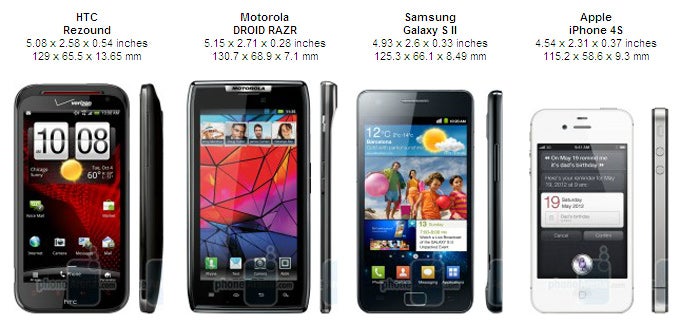
You can compare the HTC Rezound with many other phones using our Size Visualization Tool.
We’ve been teased by it for many months now, but a 720p display is finally for real with a handset – and the HTC Rezound is the first one to market with it in the States!
The 720x1280 pixel resolution is an incremental leap forward, following after other popular resolutions like WVGA 480x800 and qHD 540x960. When you do the calculation, the Rezound’s 4.3” display is the most detailed out there with pixel density of 341 ppi. In contrast, the iPhone 4S Retina display boasts a pixel density of 326 ppi – so finally, the Rezound is the first phone to beat it in this aspect.
Even though we’re convinced on paper at how it’s superior in resolution, it’s ultimately our eyes that are going to concretely confirm those allegations. The visual detail is most profoundly evident when we look at the display up close and personal– or when looking at tiny details, like text when we’re in a zoomed out view in the web browser. At that point, yes, we behold the majestic detail that the 720p display has to offer – making even the faintest of lines and curves pop with plenty of clarity. As you can see in the photos, detail is so much better than a standard screen, which results in beautifully looking icons, menu details and so on. Nevertheless, its Super LCD (S-LCD) panel continues to deliver the characteristic traits that the display type is known to exhibit – like some deep and vibrant color tones. However, it does suffer from poor viewing angles and outdoor visibility.
Spacing themselves away from the bottom edge of the handset, we gladly accept the minimal accidental presses we find when touching its capacitive Android buttons, which sport a deep red glow (reminding of the Beats Audio element).
We’ve made it clear that we’re not blown away by the Rezound’s design, but what irks us most about the handset, is that its physical buttons are notoriously difficult to feel out. Both the power button and volume rocker are completely flush – thus, offering very little feel. Additionally, it doesn’t help that their response is subtle to the touch.
Above the display, we’re presented with the typical narrow looking earpiece that has been the staple of nearly all HTC smartphones of late – plus, the handset’s front-facing 2-megapixel camera is perched nearby.
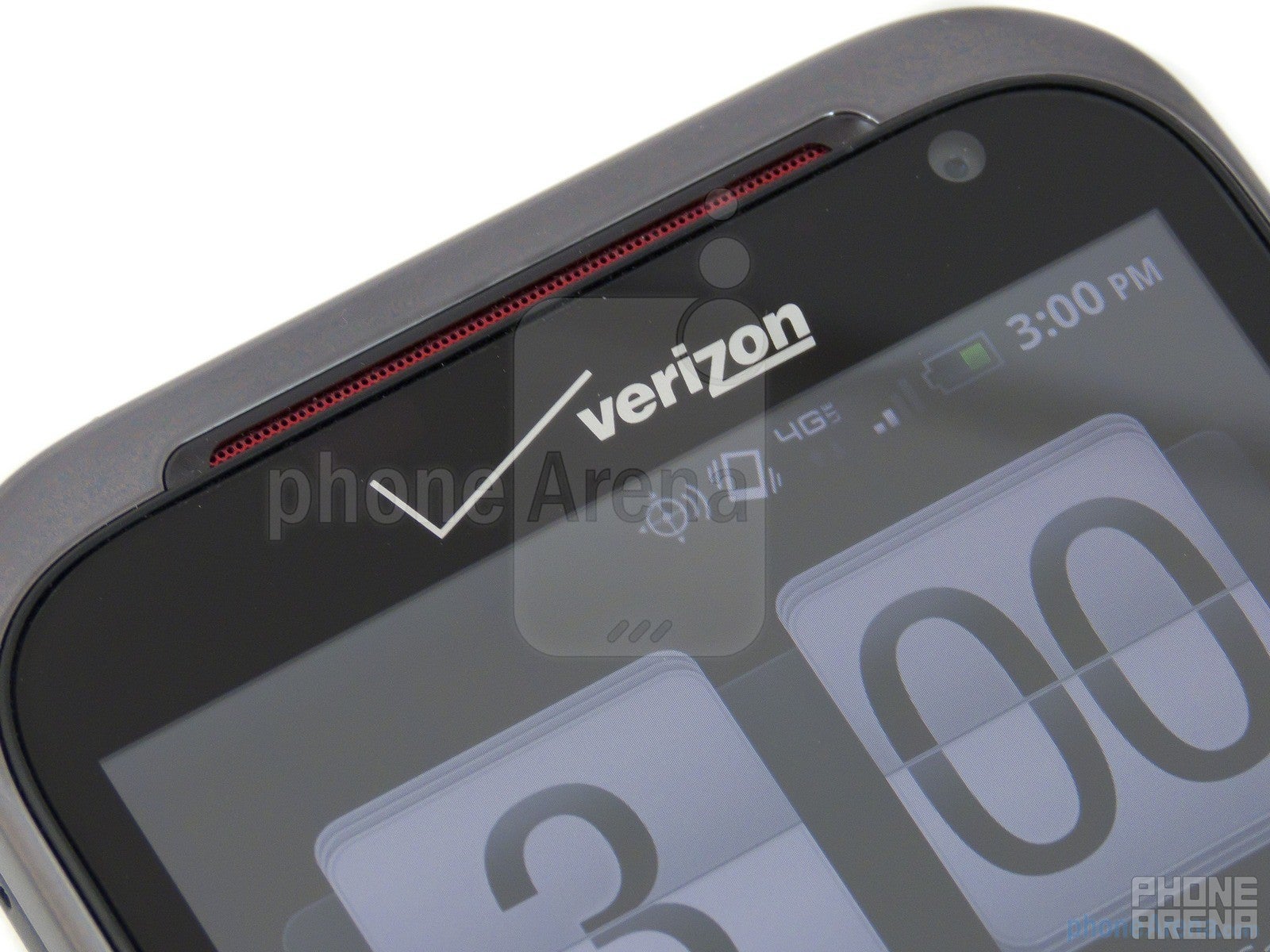
The 2-megapixel front-facing camera
Much like other recent HTC smartphones, the microUSB port on the HTC Rezound offers video-out functionality, but it requires the use of an optional MHL adapter that you’ll need to supply yourself.
Rounding its high-spec’d hardware, the Rezound is packing a sizable 8-megapixel auto-focus camera with dual-LED flash in the rear, which isn’t all that surprising at the very least . Meanwhile, prying off its rear cover grants us access to it 1,620 mAh battery, SIM card slot, microSD slot, and speakerphone grill.
HTC Rezound 360-degrees View:
Interface:
In order for it to maintain its spiffy 720p display, the Rezound requires some serious processing power to exhibit the class and eloquent nature that we tend to expect with today’s modern high-end smartphones. Thankfully for all of this, HTC finally brings a dual-core processor to the mix with its second 4G LTE smartphone – as opposed to the underwhelming single-core one with the ThunderBolt. Behind it all, there is a 1.5GHz dual-core Qualcomm MSM8660 processor coupled with 1GB of DDR2 RAM, which is obviously a tasteful complementary offering.
Honestly, this is probably the fastest and most responsive HTC Android smartphone we’ve had the opportunity of checking it out. In fact, we can sense just that, as it’s able to track tightly the movement of our finer as we move through its homescreen – though, its rate is swimmingly quick with a static wallpaper. However, things drop down the moment when we activate a graphically intensive live wallpaper, which is strange considering it’s packing an Adreno 220 GPU. Gone is its smooth finesse, and instead, we notice some choppiness with its operation – albeit, it’s nothing detrimental. All in all, it’s a fast device that accomplishes just about any task without much exertion, but lacks the fluidity that we see on the Samsung Galaxy S II.
It could’ve been a first if it weren’t for the HTC Rhyme, but the Rezound is the second device on Verizon’s lineup to feature the most up-to-date Sense 3.5 experience running on top of Android 2.3.4 Gingerbread. Beyond the glamorous hardware, we don’t classify Sense as a skin running on top of Android, but rather, it’s an all-encompassing organic experience that continues to enthrall us with its remarkably deep level of personalization and usefulness. As a whole, this isn’t a dramatic change from what we’ve seen before already, but we continually see its willingness to strive in singlehandedly being the utmost best customized Android experience out there.
The Rezound runs on Android 2.3 Gingerbread straight out of the box, but is expected to be updated to 4.0 Ice Cream Sandwitch in “early 2012”.
Contacts:
Clicking on the “People” icon in the app drawer will bring up a list of all your contacts shown alphabetically and with their picture on the left side. This is populated by your Google, Facebook, Flickr and Twitter accounts, as well as being able to tie-in with Microsoft Exchange ActiveSync accounts. When you click on a contact, it will then open up a new screen and show all their information, as well as 4 icons on the bottom for viewing their details, threads, updates, and gallery. This is all very useful, and we love the way that HTC Sense brings all this information together, yet makes it easy to use.
Organizer:
The calendar works verywell, as it pulls information from all your accounts (Google, Facebook, Exchange, PC Sync) and aggregates them to the phone. This way, when you go to the calendar app (or desktop widget), all your events are shown in a day, week, or monthly view. You can also click on them to add reminders and alert tones.
Messaging:
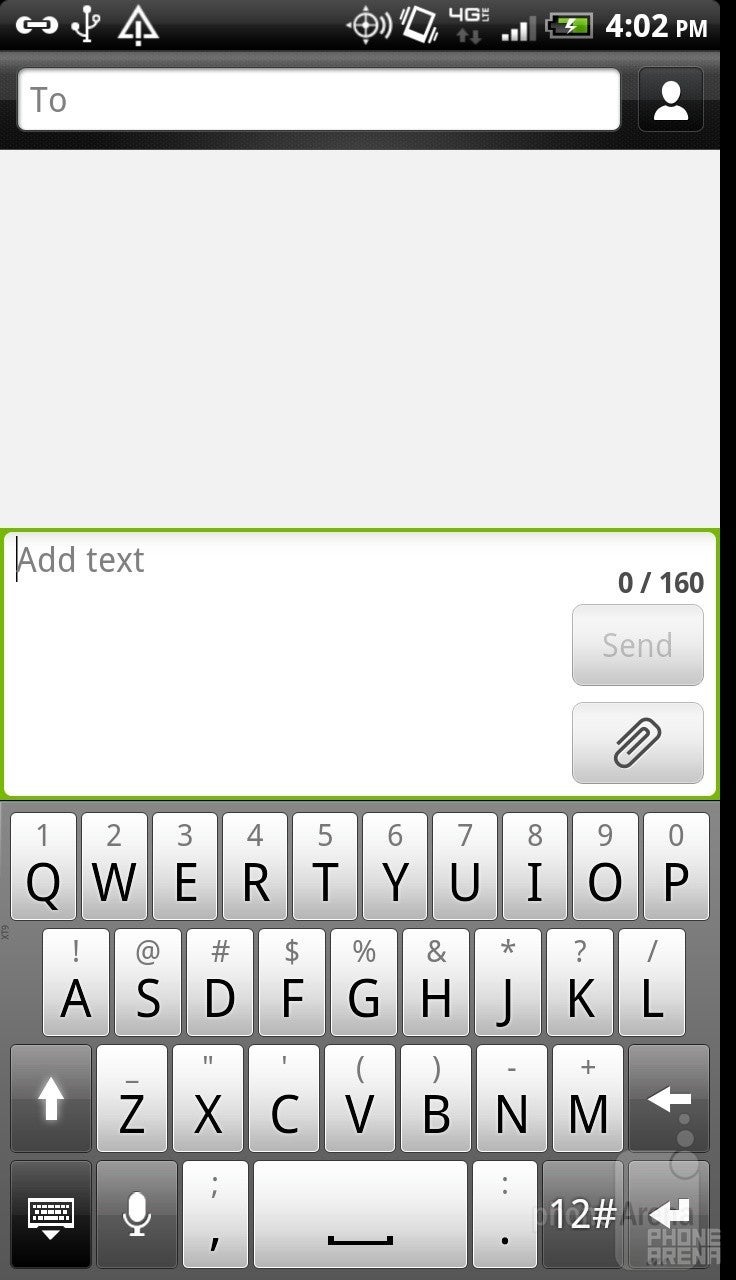
You can automatically setup your email for Microsoft Exchange ActiveSync, AOL, Yahoo!, Windows Live Hotmail, and GMail, as well as manually entering in your own POP3 and IMAP accounts. Once they are all set up, you can view your emails by account, or in a combined view that designates each account’s email with a different color bar on the left side. Naturally, you can also send and receive text and picture messages, as well as using the Mobile IM program to connect with Windows Live, Yahoo! and AIM buddy lists. Google Talk continues to use its own separate app.
Camera:
As other recent HTC phones, the camera app has received a nice update as it now supports some extra features, such as 14 different visual effects, face detection, and manual image adjustments of the exposure, contrast, saturation, and sharpness. There is also a selection of 9 different scene modes to choose from. Like most other HTC phones, the Rezound does not come with a physical camera button. Instead, the camera continues to auto-focus on the center square shown on the display, or you can move the square around if you want to change where it will focus. To capture the image, you simply press on shutter icon on the right side, and it takes the image almost instantly.
On paper, there seems to be a lot to like about its 8-megapixel auto-focus camera, which features backside illumination, dual-LED flash, and wide-angle F2.2 lens for larger aperture. Sometimes, we can be jaded by all of the hype surrounding a handset’s photo-taking capabilities, but in the case of the Rezound, we’re simply not convinced after peeking over some of the results.
Overall, its production is average, with macro shots being its best specialty. Color-wise, it tends to be on the saturated side, which is able to raise our brows thanks to its vibrant and robust tones, but it tends to cast this purplish hue that doesn’t accurately portray the real-world scenario. Above all, the main distraction we notice is that fine details are simply indistinct. The images are usable for 4x6” prints, but are not on par with the best 8-megapixel phone cameras.
With shots taken under low lighting, its exposure is considerably increased to enhance details, but at the same time, it’s dealt a blow with some evidence of noise – though, its dual-LED flash counteracts it.
The HTC Rezound’s 1080p videos are shot in MPEG-4 format instead of the .3GP we found on the Vivid. So what’s good this time? It displays a smooth capture rate of 30 frames per second, mostly noise-free audio recording, and very minimal artifacting. Naturally, that’s fine and dandy, but what distracts us yet again is its vague looking details – it simply doesn’t exhibit the quality you’d expect for something tagged with ‘high-definition.’ Just like the Vivid, the Rezound offers a slow-motion mode that gives us a neat effect with recording that we don't typically see – though, its capture resolution is set at 720p at the most. It captures at 60 frames per second, but the final video is 30fps, thus making it 2x slower.
HTC Rezound Sample Video:
HTC Rezound Slow Motion Sample Video:
Multimedia:
It’s one thing to offer the full-fidelity audio experience with Beats Audio, but it would’ve been nice for the music player to receive some love as well – in the end, it utilizes the same layout and presentation we’re used to finding. Popping in the included iBeats headphones and activating Beats Audio, our ears explode with the rippling effects of heavy bass tones that really accentuate both high and low pitches. These are the best headphones bundled with a phone, and most people listening to modern music will not feel the need to upgrade with other in-ear headphones. However, the Beats Audio profile is not a great deal and we wish there was something special in the hardware, resulting in better than the ordinary sound quality. Switching to the internal speaker, it’s undoubtedly strong with its volume output, and it doesn’t strain at the highest setting, but it lacks the thunderous pitches that we hear using the iBeats.
Being the perfect companion of any 720p video, especially when its screen resolution matches up, its performance is naturally seamless. Checking out some of the preloaded MPEG-4 720p videos on the handset, they obviously showcase the display’s bountiful performance with its rich details, smooth playback, and iridescent colors. Strangely, its exhibits some lag when playing another test video that’s encoded in H.264 with 1920 x 1080 resolution.
Sharing multimedia content couldn’t be any easier on the HTC Rezound seeing that it features an MHL port – but of course, you’ll be the one supplying the adapter. Nonetheless, we’re given the opportunity of getting a mirrored experience to show everything we do on the handset, all on a high-def television. Otherwise, its DLNA functionality is a decent alternative as well – as long as you have compatible devices.
Finding a 16GB microSD card included with the handset, it’s more than sufficient by today’s standards, but it’s further supplemented by 10.48GB of internal storage. Furthermore, there’s 2.1GB of memory strictly reserved for apps. Still, if the card isn’t enough, you can use cards up to 32GB in size.
Internet and Connectivity:
Packing 4G LTE connectivity, it’s blazingly fast in loading up complex web sites like ours in less than 20 seconds – much like the others in Verizon’s 4G LTE stable. Accompanying the fast speeds, are the responsive navigation controls that offer a near instantaneous response with everything – plus, it handles Flash content without sweating one bit. All in all, when you add in its 720p display, it essentially offers one fabulous desktop-like experience that will no doubt be any web surfer’s dream device.
Like all of Verizon’s 4G LTE smartphones, the HTC Rezound follows in accordance by essentially being compatible to work on Verizon’s network. Furthermore, it packs all of the usual cast of connectivity options like aGPS, Bluetooth 3.0, 802.11 b/g/n/a Wi-Fi, and mobile hotspot functionality. With the latter, it offers exceptional signal strength in allowing devices as far as 30 feet away to connect to it.
Software:
On the software side, there’s nothing of particular interest since it’s mainly comprised of apps that we tend to find preloaded with most of Verizon’s portfolio. Not surprisingly, Big Red’s presence is blatantly evident with things like Backup Assistant, Mobile Hotspot, Mobile IM, V CAST MUSIC, My Verizon Mobile, Verizon Video, and VZ Navigator. Meanwhile, there’s a ton of bloatware on there, with some being more useful than others. These consist of Amazon Kindle, Blockbuster, Need for Speed Hot Pursuit, Polaris Office, Scan, and Slacker. And if you happen to love videos a lot, besides those from YouTube, you’ll definitely appreciate the catalog available with HTC Watch – it’s the hub where you can rent or purchase movies and television shows.
Performance:
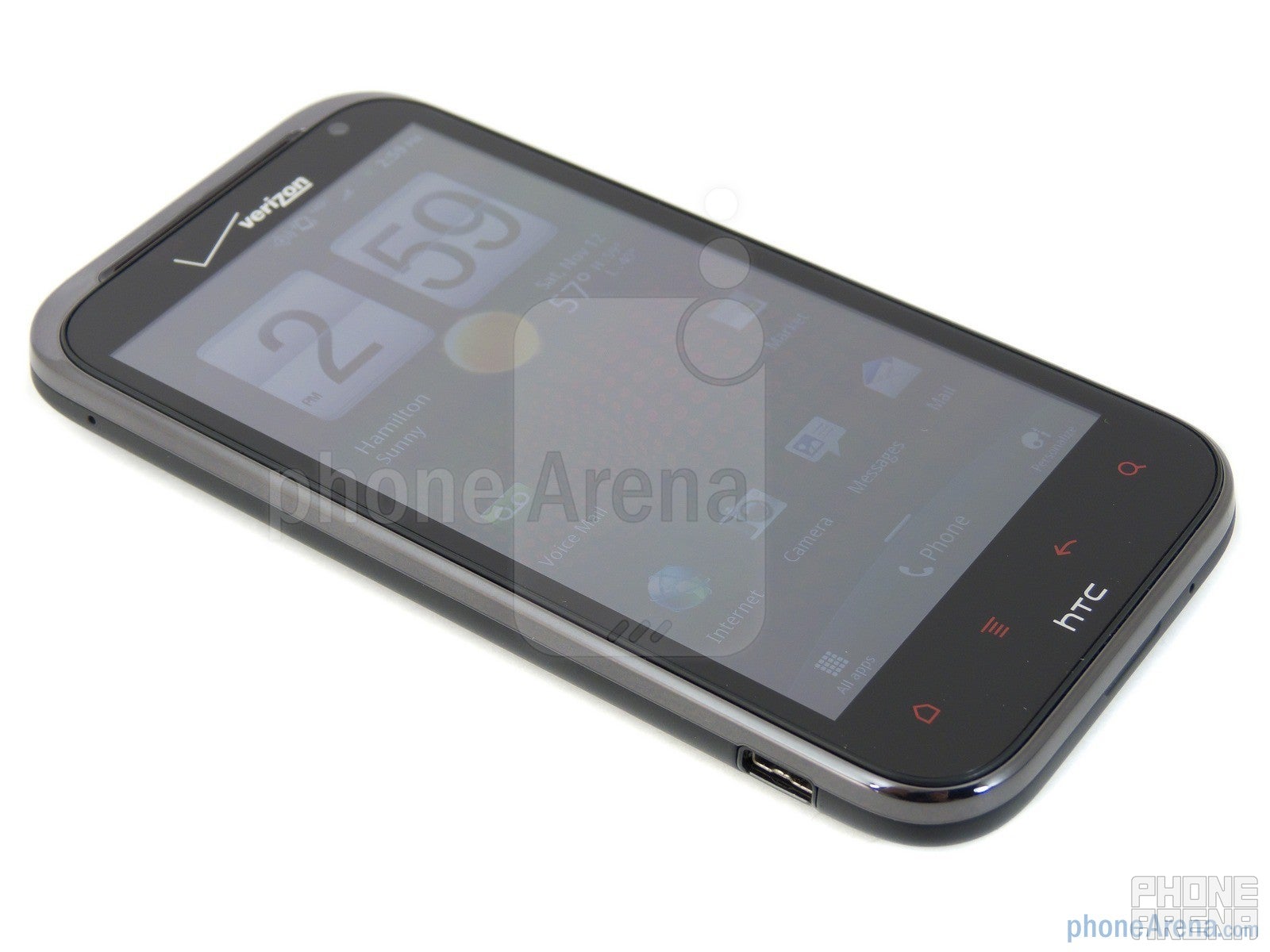
Similar to what we’ve seen with other 4G LTE smartphones, the HTC Rezound is sometimes unable to retain a solid 4G LTE network indoors – but it doesn’t seem affected outdoors. It didn’t drop any phone calls during our testing in the greater Philadelphia region.
Diving into it ahead of time, we weren’t all that confident in the battery life department considering that its 1,620 mAh battery has to deal with a device packing a 720p display and dual-core processor. Rightfully so, our assertions are confirmed as we’re able to get around 10 hours of juice on normal usage with a single charge. That’s not particularly going to jive well for power users, seeing that they’ll constantly find themselves charging it as much as possible, but it won’t even get us a day’s worth of usage. In combating its less than ideal battery life, you can always set the device to connect via 3G only as opposed to the battery zapping connections of 4G LTE speeds.
Conclusion:
After seeing the Motorola DROID RAZR, it’s really hard to fall in love with the HTC Rezound’s design. We are fine with it not being the slimmest out there, but it is rather strange that it is one of the thickest.
Taking into account that it’s priced at the highest end of the ladder at $299.99 with a 2-year contract, it’s undoubtedly on the pricey side on any budget. The DROID RAZR fights for it with design, while the HTC Rezound does it with specs. Obviously, its 720p display is remarkably detailed enough to exhibit plenty of sharp visuals to wholeheartedly capture the title of being the most detailed display on the market. Needless to say, we love its detailed production, but wish it was better with outdoors visibility. Furthermore, it has the prestigious title of being the first smartphone in the US to offer Beats Audio support, but as we've said before, it is rather just a great pair of bundled headphones. However, save for the display, it is nothing out of the ordinary - compare it to the DROID BIONIC, and you'll not find other big advantages for the Rezound. In addition, the soon to come Samsung GALAXY Nexus will also offer a high-res 720p display, however it will be a huge 4.65” Super AMOLED one, packed in a slim body. It will also be the first one to be running on the latest Android 4.0 straight out of the box, instead of waiting for an update. However, the HTC Rezound simply lacks the crucial element of having that initial visual appeal that makes the Motorola DROID RAZR so breathtaking at the $300 price point. Looking over its specs sheet, there are obviously a few standouts that make it unique, but they’re simply not profound enough to entice us.
Software version of the reviewed unit:
Android Version: 2.3.4
Sense Version: 3.5
Software Version: 1.02.605.6
HTC Rezound Video Review:


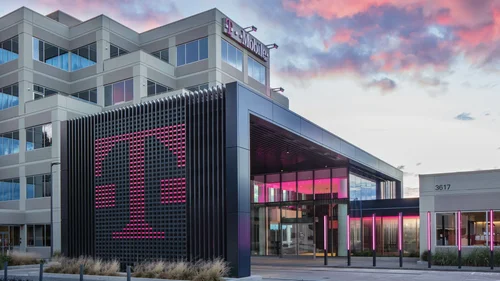
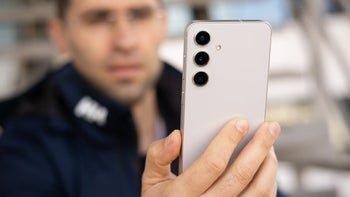

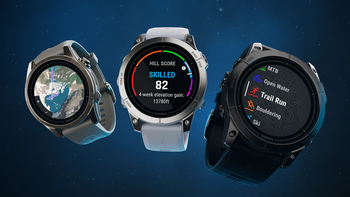






Things that are NOT allowed: